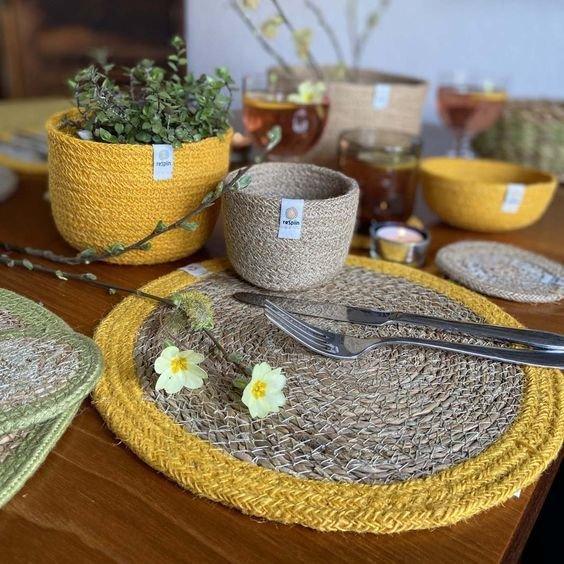Small home choices can make a big difference to everyday safety, especially in busy households and low-waste routines. In this Friendly Turtle EcoBlog guide, we look at eco-friendly safety products that help prevent common mishaps and make it easier to get support quickly if something does go wrong. Think slip risks in the bathroom, trips in low light, or those moments when your phone is nowhere near you. We cover practical swaps that don’t create clutter, including a wearable medical alert necklace for seniors, refillable first-aid essentials, reusable cold care, and rechargeable lights that make night-time movement safer. You’ll also find simple reminders on detectors and visibility aids that protect quietly in the background. The goal is a calmer, more independent home where sustainability feels realistic: fewer disposables, smarter choices, and safety habits that stick.
Share your articles with us and get published! Reach out at hello@friendlyturtle.com.
Elegant and Attractive Jute Table Mats

While we all want to undertake eco-friendly steps and make the earth a better place for us and the coming generations, the few options available sometimes makes this difficult for us to make the right choices. Fortunately, e-commerce stores are now bringing a wide range of eco-friendly options that can reduce our reliance on plastic and and instead promote sustainable materials. Jute, used in our jute table mat, is a natural fibre that offers many benefits to the environment during its growth and even after. When you want to buy the best looking table mats for your dining table and home from a leading plastic-free shop in the UK, the jute dining mats can be a viable and eco-friendly option.
How your Jute dining mats benefit the environment
Jute is a naturally grown material that absorbs a huge amount of carbon dioxide during its growth and production. Jute's growth reduces the level of carbon dioxide in the atmosphere and the adverse effects of global warming. Hence, the use of jute mats is a highly ethical and sustainable approach that is environmentally friendly and makes the earth a better place for everyone living on it. Jute plants can also trap or create the nutrients and enrich any soil on which they are grown. Therefore, their plantation is great for communities and farms that want to enhance the productivity of their fields.
Hygienic and Safe
The leading manufacturers of jute mats (sustainable homeware) ensure that they only use quality production processes. The handmade products do not have any chemicals added to them that can be harmful to human health. These dining mats can be safely used for any of dining and serving purposes. The use of a jute table mat also prevents the undesired marks, spills, or residues that are sometimes left behind on our dining tables. The beautiful impression they make is always enjoyable and will be appreciated by your relatives, friends, and family members.
Affordable Prices
The jute dining mats are made of organic materials and are incredibly affordable whilst also being a highly sustainable homeware. The same is also true for other kinds of products containing jute. Therefore, you can add aesthetics, elegance, and hygiene to your dining tables and standards at quite a low cost when you use the organic and zero waste jute dining mats.
The jute dining mats are available in a range of beautiful colours from natural dyes, and designs which can be purchased online at our online plastic-free shop in the UK.
0 comments
Let customers speak for us
Blog posts
A feature wall can instantly make a living room feel more intentional, adding depth and character without a full renovation. The key is choosing the right surface (often the wall behind the sofa, fireplace, or TV), then matching colour, texture, and lighting to the way you actually use the space. Deep blues, greens, and charcoals create a cosy, evening-friendly mood, while warmer terracottas and ochres bring energy for social rooms. If paint feels too simple, wallpaper, slatted panelling, or subtle texture can deliver impact without overwhelming the rest of your décor. Keep sight lines in mind, avoid walls broken up by doors and windows, and test samples across morning, afternoon, and lamp light before committing. At Friendly Turtle EcoBlog, we love home updates that look great and last: thoughtful choices, quality finishes, and flexible styling that won’t date after one season.
Good oral health starts long before the first wobbly tooth. When children learn simple routines early, they’re far more likely to avoid cavities, gum irritation and the stress of emergency appointments later on. Begin with regular dental check-ups so small issues are spotted quickly and visits feel normal, not scary. At home, let your child choose a toothbrush they actually like, then guide them through gentle circular brushing for two minutes, twice a day. Add flossing as soon as teeth touch, and keep it upbeat with a short story or a timer song. For a more planet-friendly routine, pick durable brushes (or responsibly sourced bamboo), turn off the tap while brushing, and choose refillable or recyclable packaging where possible. Friendly Turtle EcoBlog shares practical, low-waste lifestyle ideas like these, helping families build habits that protect little smiles while treading lighter on the Earth.



